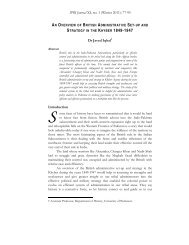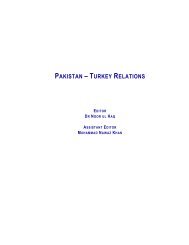120 Whither Kashmir? (Part II) - Islamabad Policy Research Institute
120 Whither Kashmir? (Part II) - Islamabad Policy Research Institute
120 Whither Kashmir? (Part II) - Islamabad Policy Research Institute
Create successful ePaper yourself
Turn your PDF publications into a flip-book with our unique Google optimized e-Paper software.
<strong>Whither</strong> <strong>Kashmir</strong>?<br />
• November 2, 1947: <strong>Kashmir</strong>is have a right to determine future:<br />
Nehru: Indian Prime Minister, Jawaharlal Nehru, in a speech aired<br />
on All-India Radio, reaffirmed the Indian Government's<br />
commitment to the right of the <strong>Kashmir</strong>i people to determine their<br />
own future through a plebiscite:<br />
"We have declared that the fate of <strong>Kashmir</strong> is ultimately to be<br />
decided by the people. That pledge we have given, and the<br />
Maharajah has supported it, not only to the people of Jammu<br />
and <strong>Kashmir</strong>, but also to the world. We will not and cannot back<br />
out of it. We are prepared when peace and law have been<br />
established to have a referendum held under international<br />
auspices like the United Nations. We want it to be a fair and just<br />
reference to the people and we shall accept their verdict."<br />
The Government of India accepted the "Instrument of accession"<br />
conditionally, promising the people of the state and the world at<br />
large that "accession" would be final only after the wishes of the<br />
people of the state were ascertained upon return of normalcy in the<br />
state.<br />
• January 1948: India brings <strong>Kashmir</strong> issue to UN Security Council:<br />
India brought the issue to the United Nations Security Council in<br />
January 1948. The rebel forces had been joined by volunteers from<br />
Pakistan and India charged Pakistan with having sent "armed<br />
raiders" into the state. It demanded that Pakistan be declared an<br />
aggressor in <strong>Kashmir</strong>. Furthermore, India demanded that Pakistan<br />
stop aiding Militants, and allowing the transit of tribesmen into the<br />
state. After acceptance of these demands, coupled with the<br />
assurance that all "raiders" were withdrawn, India would allow a<br />
plebiscite to be held under impartial auspices to decide <strong>Kashmir</strong>'s<br />
future status. In reply, Pakistan charged India with maneuvering<br />
the Maharajah's accession through "fraud and violence" and<br />
colluding with a "discredited" ruler in the repression of his people.<br />
Pakistan's counter complaint was also coupled with the proposal of<br />
a plebiscite under the supervision and control of the United<br />
Nations to settle the dispute.<br />
• April 21, 1948: UN resolution envisages cease-fire, withdrawals:<br />
The Security Council discussed the question from January until<br />
April 1948. It came to the conclusion that it would be impossible to<br />
determine responsibility for the fighting and futile to blame either<br />
side. Since both parties desired that the question of accession should<br />
83




